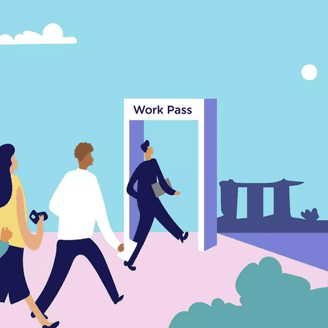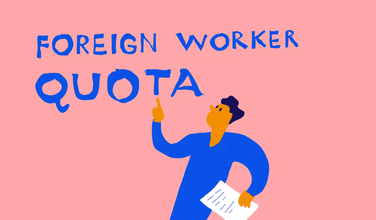- Osome Blog SG
- The Difference Between an Employment Pass and an S Pass in Singapore
The Difference Between an Employment Pass and an S Pass in Singapore
- Modified: 14 May 2025
- 4 min read
- Foreigner's Guide


Francesca Del Giudice
Author
Francesca is a content creator with over 5 years of cross-industry experience that spans academic research, consulting, venture, and tech startups.
After registering your company in Singapore and increasing the number of employees in your company, you may want to hire talent from overseas.
If you’re wondering what the difference between an S Pass and an Employment Pass is, the answer is a few things, in fact. Though similar, there are some fundamental differences between these two types of work visas.
What Is an S Pass and an E Pass?
An Employment Pass (EP) and an S Pass are two distinct work permits that enable foreign nationals to work legally in Singapore under a locally incorporated company.
The Employment Pass is designed for highly skilled professionals, managers, and executives, typically requiring specific qualifications such as a recognised degree, relevant professional experience, and a minimum salary threshold.
On the other hand, the S Pass is aimed at mid-skilled workers in various industries, such as technicians and support staff, who meet criteria related to qualifications, relevant work experience, and a lower salary threshold compared to the EP.
Both passes are integral to Singapore’s workforce, allowing businesses to access specialised talent while maintaining standards for employment and economic growth.
It can get confusing so talk to us if you need to clarify things. We have in-house immigration consultants who ensure your company is compliant and updated with the latest changes.
Who Can Apply for an Employment Pass and an S Pass?
Highly skilled professionals who have a job offer in Singapore and work in a managerial, executive or specialised job should apply for an Employment Pass. The Ministry of Manpower (MOM) provides a list of standard occupations that typically qualify for an EP, which can guide applicants and employers through the process. For mid-skilled workers, the S Pass is more appropriate, catering to those with relevant qualifications and experience suited to roles that do not require the level of expertise demanded by the EP.
Both the Employment Pass (EP) and S Pass require applications to be submitted by either a Singapore-registered employer or an appointed employment agent. This ensures that the applicant is being sponsored and vetted by a recognised entity within the country. Importantly, if an EP or S Pass holder changes jobs, the new employer must submit a fresh application for a new pass. This rule maintains proper oversight and ensures that each employment relationship is formally approved, reflecting Singapore’s commitment to regulated employment practices for foreign workers.
Employment Pass vs S Pass: Requirements & Eligibility
To help you along, we’ve broken down the eligibility criteria for an S Pass and Employment Pass and unpacked the minimum salary requirements so you can feel confident when planning which is best for you and your prospective new hires.
| S Pass | Employment Pass | |
| Minimum Salary Benchmark | Earn a fixed monthly salary of at least S$3,150. | Earn a fixed monthly salary of at least S$5,000. The salary will vary depending on the sector and years of work experience. |
| Education or Work Experience | Have a degree, diploma or technical certificate that requires at least 1 year of full-time study. Also must have relevant work experience. | Have acceptable qualifications, usually a good university degree, professional qualifications or specialised skills. |
| Foreign Worker Levy and Quota | There is a foreign worker levy and a Skills Development Levy. | No foreign worker levy or quota required. |
An Employment Pass and an S Pass Validity Period
The validity period for an Employment Pass (EP) and an S Pass differs slightly, reflecting the nature and duration of employment for different types of workers.
An Employment Pass is typically issued for an initial period of up to 2 years and can be renewed for up to 3 years thereafter, depending on the terms of employment and compliance with the Ministry of Manpower’s (MOM) guidelines. This longer renewal period is designed for highly skilled professionals whose roles often involve long-term projects or strategic positions.
The S Pass, tailored for mid-skilled workers, is also initially granted for up to 2 years, with renewals available for up to 3 years. The renewal depends on the employer’s continued eligibility, compliance with MOM’s requirements, and the pass holder’s work performance and adherence to employment regulations.
Both passes must be renewed before expiration to maintain the legal work status of the holder in Singapore.
The Minimum Set of Documents Needed for Applying
The following are the requirements for S Pass and Employment Pass applications:
- Personal particulars page of the candidate’s passport;
- Company’s latest business profile or instant information registered with Singapore’s Accounting and Corporate Regulatory Authority (ACRA);
- Candidate’s educational certificates, e.g. degree certificate.
You can also check your or your potential employee’s eligibility for an Employment Pass / S Pass using this free official Self-Assessment Tool.
How Much Levy Does My Business Need To Pay for an S Pass Holder?
As an employer, you must pay the levy for all your S Pass holders. The levy liability starts from the day the S Pass is issued and ends when the pass is cancelled or expires. For the services sector, the S Pass levy rate for businesses is as follows:
| Tier | S Pass Quota % of Your Total Workforce | Monthly Levy Rate | Daily Levy Rate |
| Basic / Tier 1 | Up to 10% | $330 | $10.85 |
| Tier 2 | Above 10% to 13% | $650 | $21.37 |
For all others sectors excluding services, the S Pass levy rates are:
Tier | S Pass Quota % of Your Total Workforce | Monthly Levy Rate | Daily Levy Rate |
|---|---|---|---|
| Basic / Tier 1 | Up to 10% | $330 | $10.85 |
| Tier 2 | Above 10% to 20% | $650 | $21.37 |
What is the daily levy rate?
The daily levy rate applies only to S Pass holders who did not work for a full calendar month.
Here’s how you calculate it:
(Monthly levy rate x 12) / 365 = rounding up to the nearest cent.How To Apply For an Employment Pass or S Pass for an Employee
If your company needs to hire a foreign national, here’s how to apply for an Employment Pass or an S Pass:
- Post a job ad on a government-approved website.
- The job advertised must match the occupation in the Employment Pass / S Pass application.
- The employer submitting the Employment Pass / S Pass application must be the same as the one in the job advertisement.
- The job ad must remain open for at least 28 days after publication.
- If you make amendments to job details during this period, the ad must stay open for another 28 days after the changes were made.
- On the 29th day, you can start your Employment Pass / S Pass application.
- You cannot submit an Employment Pass / S Pass application if it took more than 3 months to fill in the position advertised in your job posting.
- Apply for Employment Pass using this official online service.
- Apply for S Pass using this official online service.






